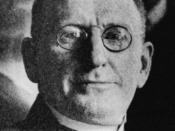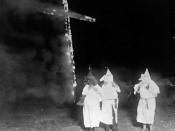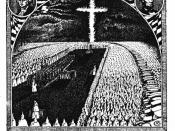Power is defined as "the ability or official capacity to exercise control". Many film directors accept the imbalance of power as the basic premise of their films. They will position the audience to recognize individuals and/or groups who have power, and those who are disempowered through race, gender, age, socio-economic status, physical attributes, knowledge, beliefs and values etc. Often, the film's story will explore the journey to empowerment of the disempowered individuals and/or groups, which normally leads to the downfall of the once powerful character/s.
Alan Parker's fact-based, but heavily fictionalised civil rights-era thriller, Mississippi Burning, employs the concept of an imbalance of power to shape the viewers' understanding of the world in the past, and also, present. The film is based on the FBI investigation into the disappearance of three young civil rights workers in a small Mississippi county in 1964. The Ku Klux Klan seem directly involved with the disappearance.
The white community, including the authorities, seem, in one way or another, involved with the Ku Klux Klan. The coloured minority, understanding that with the law against them, no justice can be served, dare not speak out, and, as a result, remain unvoiced
and oppressed. Through this structure of dominance, Parker convinces viewers of the power that exists in the law, and how that power can be taken advantage of. Throughout the film, Parker expresses this imbalance of power between the white and the coloured through insightful sound, design, editing, camera work, and acting.
Initially, two FBI agents are sent to the racially torn community of Jessup County to carry out the investigation. They are Alan Ward (William Dafoe), a young, clean-cut and by-the-book agent, and Rupert Anderson (Gene Hackman), a veteran who comes from the south and knows much more about racism first-hand than his partner.


